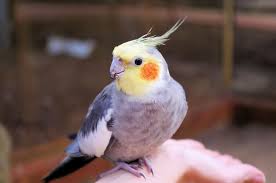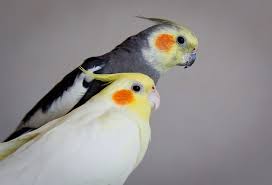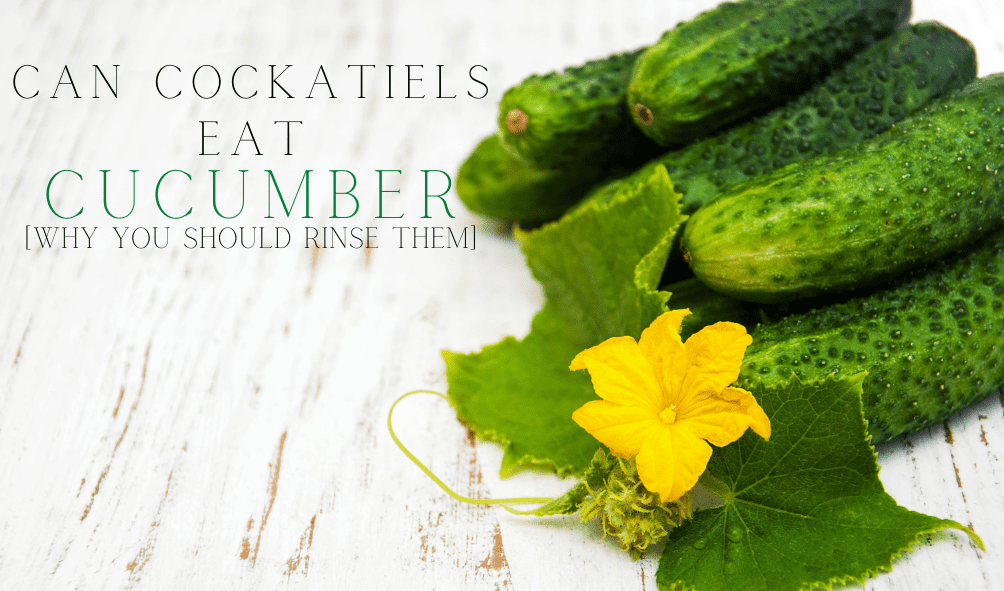Cucumber makes a great snack for your Cockatiel! Although, if you cannot find organic cucumbers, make sure to wash them first! Often, non-organic cucumbers have been polished with wax, and their peels have been sprayed with pesticides!. This makes them more appealing to consumers. Don’t worry, the benefits still far outweigh the negatives.
Cucumbers have excellent health benefits that are vital for your parrot! From the benefits of Magnesium to the benefits of beta carotene, which can help fight off cancer!
Here is an article I have written about “Can Cockatiels Eat Bananas? (Is Banana Peel Safe For Cockatiels?)” this should have an answer to a few questions you may have!
Table of Contents
- Can Cockatiels Eat Cucumber?
- The Health Benefits Of Cucumber For Cockatiels
- How Much Cucumber Should A Cockatiel Eat?
- Can Cockatiels Eat Too Much Cucumber?
- The Dirty Dozen
- Recap
Let’s get started.
Can Cockatiels Eat Cucumber?
Cucumbers are great for Cockatiels! Although cucumbers have a high water content, they should be fed in moderation! However, if provided in moderation, the water content can be a benefit! Keep your bird healthy and hydrated!

Not only can this be a healthy snack for your bird but a great bonding snack! Have your bird on your shoulder or top of their cage/perch and feed them a slice! This is great for bonding with your Cockatiel! Every meal can be a bonding time it is done correctly!
The Health Benefits Of Cucumber For Cockatiels
Feeding your Cockatiel cucumber has many health benefits! Firstly, cucumbers are incredibly low in calories with high-water content. This will keep them slim, healthy, and hydrated! A Hydrated bird is a happy bird!

Secondly, cucumber seeds are rich in nutrients! One of the many nutrients in cucumber seeds is Beta Carotene. Beta carotene is one of the many reasons cucumbers are so incredible! Beta carotene is an excellent antioxidant that can help prevent cancer!
Besides helping prevent cancer, here is a list of other vitamins and minerals cucumbers can offer your bird: Vitamin K, C, and A, magnesium, potassium, and manganese.
Vitamin C
- This is an important vitamin for your Cockatiel to have. Vitamin C is great at reducing stress.
- Having a Vitamin C deficiency can be detrimental to your little guys’ overall mental health.
- Vitamin C is great for the immune system and creating antibodies! Which will keep your birdie healthy!
Magnesium
- Magnesium is crucial to your cockatiels’ well-being. Ensuring your bird has enough magnesium keeps their little Bones, beaks, and feathers strong and healthy, keeping them adventurous.
- Not only does it keep their frame healthy, but the wiring too! Magnesium supports the nerve impulses, muscle coordination, and brain neurons in order.
- Finally, magnesium also keeps its heart-healthy! So remember to keep magnesium part of their diet.
Magnesium
- Magnesium is crucial to your cockatiels’ well-being. Ensuring your cockatiel has enough magnesium keeps their little Bones, beaks, and feathers strong and healthy, keeping them adventurous.
- Not only does it keep their frame healthy, but the wiring too! Magnesium supports the nerve impulses, muscle coordination, and brain neurons in order.
- Finally, magnesium also keeps its heart-healthy! So remember to keep magnesium part of their diet.
Vitamin K
- Vitamin K helps coagulate blood! Hopefully, your bird doesn’t get a cut, but vitamin K helps to clot the blood and slow down the bleeding if the worst does happen.
Vitamin A
- A deficiency of vitamin A leads to the overgrowth of your bird’s beak and nails! Make sure to keep these levels in check!
- Not only does a deficiency of vitamin A lead to overgrowth, but also chipping and flaking of the beak and nails. If left unchecked, this could lead to their nails and beaks breaking (which isn’t pleasant)
(Seeds are not high in Vit A, make sure cucumber or leafy greens are introduced into your parrots’ diet!)
Potassium
- Potassium is great for aiding the speed of their metabolism, as well as helping strengthen bones.
- This mineral is great for reducing blood pressure while at the same time helping to retain water!
- High Potassium diets help prevent strokes as well as keeping diseases like osteoporosis and kidney stones at bay.
Manganese
- With all the benefits of cucumber so far, I doubt you’ll need another, but here we go! Manganese is useful for strong and healthy bones. So they can clamber and climb to their heart’s content!
How Much Cucumber Should A Cockatiel Eat?
If fed correctly, Cucumbers can be great for your bird, but how much is that exactly? Since cucumbers should only be fed in moderation, try to feed them a few thin slices a week as this should be more than enough!

Due to the water content, try to keep it to no more than a few thin slices a week while giving them various other fruits/ vegetables! This will expand their taste range, and they will really thank you for it! Let the taste adventure begin!
Can Cockatiels Eat Too Much Cucumber?
Unfortunately, yes. Cucumbers are incredibly watery; cucumbers are made up of 95% water. Just like us, we need a balance of many different types of foods to be kept healthy. Getting a bit “watery” is normal if their diet gets a bit unbalanced!
Watery Stool
If their diet gets a bit watery, get ready for some squidgy poos! Not to worry, reduce their water intake and add some fiber! They’ll be happy in no time. Remember, cucumbers are a great treat but should only be given as a snack. Fruits and veg should only be 10% of a parrot’s diet.
The Dirty Dozen
A CNN article linked “here” says, “After strawberries, the “dirty dozen,” in order, are apples, nectarines, peaches, celery, grapes, cherries, spinach, tomatoes, sweet bell peppers, cherry tomatoes, and cucumbers.” This article is definitely worth a read!

In short, pesticides are used during the growing process to keep bugs and pests off the fruit to keep them fresh for you and me. Usually, buying organic can greatly reduce this issue, but if you can’t find organic, all you need to do is rinse your fruit and vegetables before use!
Recap
If you’ve made it to the end and are now reading the recap! Thank you. In this section, I like to cover the article’s highlights and go over the necessary information!
Can Cockatiels Eat Cucumber?: Cucumbers are great for Cockatiels! Although cucumbers have a high water content, they should be fed in moderation! However, if provided in moderation, the water content can be a benefit! Keep your bird healthy and hydrated!
The Health Benefits Of Cucumbers For Cockatiels: Besides helping prevent cancer, here is a list of other vitamins and minerals cucumbers can offer your bird: Vitamin K, C, and A, magnesium, potassium, and manganese.
How Much Cucumber Should Cockatiels Eat?: Due to the water content, try to keep it to no more than a few thin slices a week while giving them various other fruits/ vegetables! This will expand their taste range, and they will really thank you for it!
Can Cockatiels Eat Too Much Cucumber?: Unfortunately, yes. Cucumbers are incredibly watery; cucumbers are made up of 95% water. Just like us, we need a balance of many different types of foods to be kept healthy. Getting a bit “watery” is normal if their diet gets a bit unbalanced!
Any Questions you have relating to this article or just for me in general, leave a comment down below in the comments section.
Disclaimer: I am not an expert. Some parrots may react differently to different fruits. Please make sure you always slowly introduce a new food into their diet and keep an eye out for any adverse reactions. If your pet does start displaying symptoms of an adverse reaction, please contact your vet for advice.

